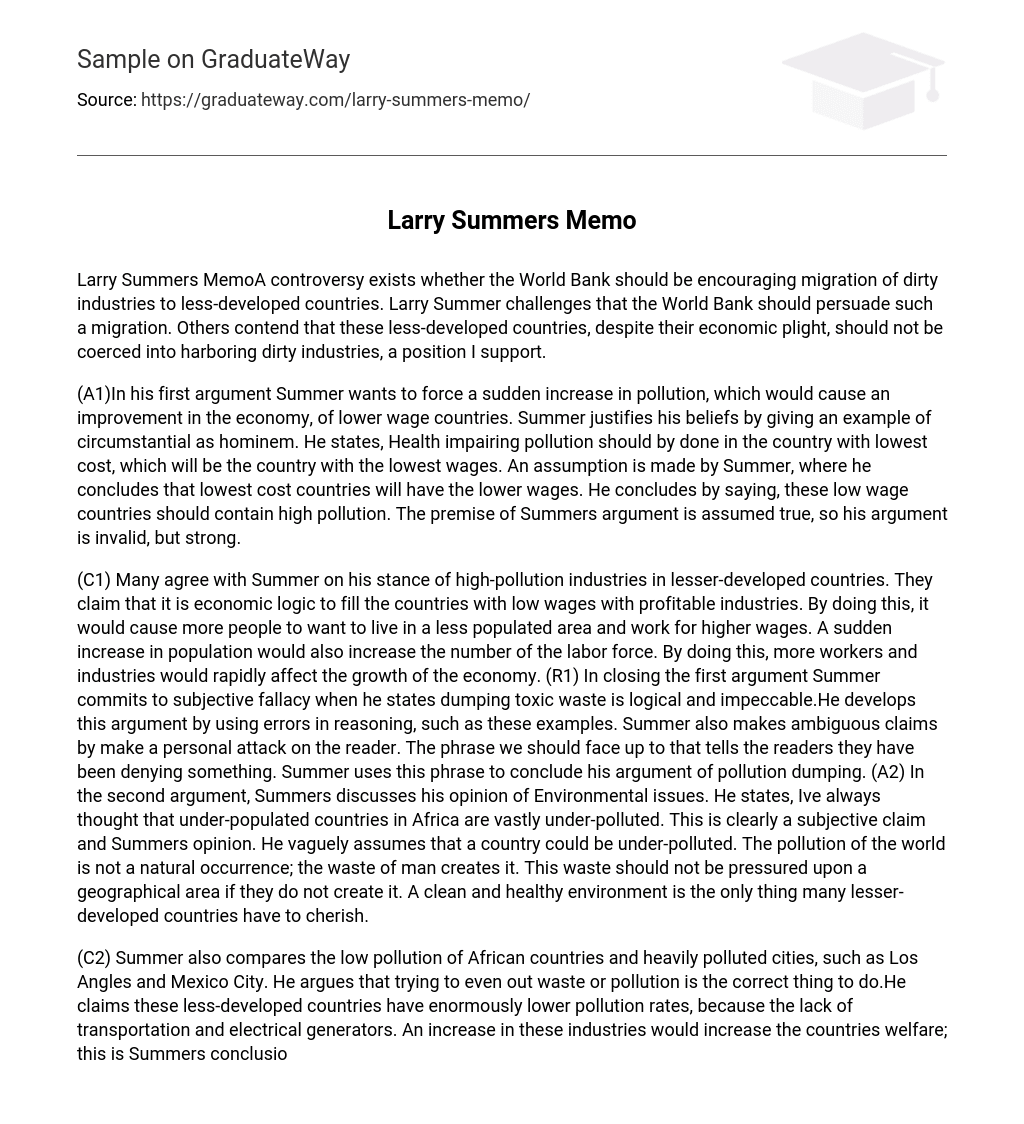The endorsement by the World Bank to relocate environmentally harmful industries to less-developed nations has sparked a controversial debate. While Larry Summer supports this migration, myself and others argue against it, stating that struggling countries should not be forced to accommodate such industries. Summer’s main argument is that an increase in pollution would lead to economic progress in countries with lower wages. To support his position, he gives an example of circumstantial ad hominem and suggests that health-detrimental pollution should happen in the country with the lowest cost, which is often associated with the one having the lowest wages. By assuming a correlation between lower costs and lower wages, Summer concludes that low-wage countries should have higher pollution levels. Although based on an assumption and lacking validity, Summer’s argument remains strong.
Support for Summer’s position on high-pollution industries in developing nations is widespread. Supporters argue that bringing profitable industries to countries with low labor costs would be economically beneficial. This, in turn, would incentivize more people to relocate to less populated areas and work for higher wages. Consequently, there would be a sudden surge in population and an expansion of the workforce, resulting in significant economic growth. However, Summer’s original argument is flawed as he incorrectly asserts that disposing of toxic waste is reasonable and without flaws. Moreover, he reinforces this assertion using faulty logic and makes vague accusations by personally attacking the reader.
Summer concludes his argument about pollution dumping by using the phrase “which we should face up to,” emphasizing that readers have been in denial. He also discusses environmental issues and expresses his belief that under-populated countries in Africa are significantly less polluted, reflecting his subjective opinion. Summer loosely assumes that a country can be under-polluted. However, it is crucial to recognize that pollution is not natural but rather a result of human waste. Therefore, it should not be imposed on geographical areas if they are not responsible for its creation. Many developing countries consider having a clean and healthy environment as their most valuable asset.
In the text, Summer argues that it is important to compare the low pollution levels in African countries to the heavily polluted cities like Los Angeles and Mexico City. He suggests that trying to distribute waste or pollution equally is the right thing to do. He believes that these less-developed countries have significantly lower pollution rates due to their limited transportation and electrical generator use. According to Summer, an increase in these industries would improve the countries’ well-being. However, spreading pollution around may seem like a practical solution, but it would be too costly for smaller countries to handle. Additionally, the World Bank is willing to provide loans for technological development, but merely investing in technology does not guarantee a country’s success. Therefore, Summers’ conclusion that spreading pollution evenly is valid is false. If borrowed money is not used wisely, it could worsen a country’s current situation, contradicting Summers’ conclusion.
Summers argues that pollution has a greater impact on less-developed countries. He claims that the concern over pollution causing a one in a million increase in the odds of prostate cancer is much higher in countries where people survive long enough to develop prostate cancer compared to countries with a high infant death rate. However, Summers uses ambiguous language by referring to pollution as an “agent” and confusing statistics such as an under-5 mortality rate of 200 per thousand. These tactics distract the reader from the main point of Summers’ argument.
My opponents argue that the discharge of pollutants into the atmosphere by industries will not directly harm a country or its people. They believe that the benefits gained by a country from industrial growth outweigh the cost of these particles. However, there are those who oppose this viewpoint and believe that clean air should not be considered a disposable commodity. They question the basis of Summer’s argument, as he assumes that these discharges have minimal impact on human health, which contradicts the opinions of many. Summer further implies that people in low-cost countries should accept the health risks associated with industrial pollution. Those who oppose Summer’s stance argue for prioritizing the well-being of less-developed countries. We believe that a country’s profitability and income should not always take precedence and that careful consideration should be given to improving the welfare of these nations, as emphasized by the World Bank.





